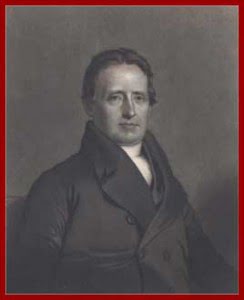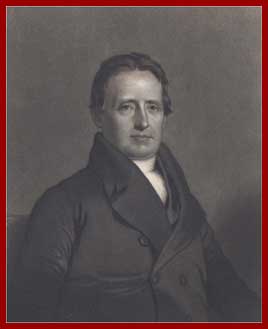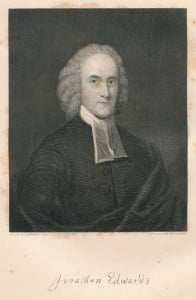Learning to Wait Upon the Lord.
The Rev. Jacob Jones Janeway [1774-1858] was an early Philadelphia pastor who served initially as an associate alongside the Rev. Ashbel Green. Rev. Janeway was also a close friend and supporter of the early Princeton Seminary faculty.
In October of 1829, Dr. Green decided to accept a call to serve as president of Princeton College, and the people in his Philadelphia congregation, out of respect to his views of duty, made no opposition. Along with this pastoral bond, a union of the colleagues of thirteen years was to be dissolved. Never had there been variance, but always peace, friendship, and harmony. The junior pastor invoked God’s blessing upon his departing friend, and thus it was that Rev. Janeway wrote in his diary:—
October 25, Sabbath.
 “This day I stood before my people as their sole pastor. Last Tuesday, Dr. Green was dismissed from his charge. Thus a connection which has subsisted between him and me for almost fourteen years has been dissolved. My burden is great, my station very responsible. I feel its importance and my own insufficiency. I am meditating on the promises, and endeavour to trust in God for all needed aid. He hath said, ‘Lo, I am with you always! My grace is sufficient for you. I will never leave nor forsake you!’ Precious promises ! May my faith be strong! What may be the Lord’s will, I know not. I am praying to know it. Sometimes I think of retiring from this place, in the expectation of becoming more useful by having more time for study. The Lord direct me and preserve me from error. When I touched on the dissolution of our connection, my soul felt, and my voice faltered. I have loved my colleague, and he has loved me. May our friendship be perpetual!”
“This day I stood before my people as their sole pastor. Last Tuesday, Dr. Green was dismissed from his charge. Thus a connection which has subsisted between him and me for almost fourteen years has been dissolved. My burden is great, my station very responsible. I feel its importance and my own insufficiency. I am meditating on the promises, and endeavour to trust in God for all needed aid. He hath said, ‘Lo, I am with you always! My grace is sufficient for you. I will never leave nor forsake you!’ Precious promises ! May my faith be strong! What may be the Lord’s will, I know not. I am praying to know it. Sometimes I think of retiring from this place, in the expectation of becoming more useful by having more time for study. The Lord direct me and preserve me from error. When I touched on the dissolution of our connection, my soul felt, and my voice faltered. I have loved my colleague, and he has loved me. May our friendship be perpetual!”
A separation of the two churches was under discussion. As the one in the Northern Liberties had increased, and was now able to sustain the gospel, Dr. Janeway was in favour of the movement. It drew from the people in the new church, expressions of the most ardent attachment, and they urged as their chief objection, their unwillingness to leave his pastoral care. The Presbytery confirmed the separation, and dissolved the pastoral relation. Dr. Janeway was appointed to organize the First Presbyterian church in the Northern Liberties. Fourteen years and more had he served them, and he was honoured of God in building up the church, by increase in the number of their worshippers, and in bringing souls into his kingdom. When he announced to them that he was no longer their pastor, a great sensation was produced, and in the afternoon he laboured to show that the new arrangements were for their good; and finally, to soothe their feelings, it was required by them, that he should continue to preach with them, in exchange with the minister whom they might call. Deeply gratifying to his feelings was the affection manifested, and long was his memory precious among those who heard the gospel from his lips.
” God has given me,” he writes about this time, ” a very conspicuous station. But my ambition is to have a people that love me, and if it were the pleasure of God, I think I could without reluctance, retire from my present charge to one in the country. What avails being known, except deriving from it opportunity for doing good? May I be humble, active, diligent, successful, useful.” So much was his mind exercised on the subject, that after much prayer, it seemed to him to be his duty to resign his charge, though he decided to wait until the ensuing spring. As far as he could see, his mind decided, for reasons which satisfied him then, to seek a place more retired, and where he hoped to live in the hearts of a rural population. He did not fail to confer with his venerable preceptor, and lay his heart bare. In reply, he received the following letter [from Dr. Green], which, for its excellent spirit and Christian friendship, and as exhibiting a specimen of that excellent and holy man, we insert:—
” With much attention and tender concern I have read your last esteemed letter. I enter fully into your meaning, and I think I know your feelings and views. They are, I hope, correct and proper. The desire you cherish may be well founded; and as such, it will meet with the Divine approbation. But let me remind you, that it is usual with the Lord in His divine providence, to make His children wait for the accomplishment, even of those designs which He Himself has excited. In this way, they learn to live by faith, and exercise patience, which last is one of the most difficult to learn and practise, of all the Christian graces. Let what passes in your mind remain there undisclosed, at least for the present; what you impart to me is sacred and secret, but it will not be advisable as yet, to intimate any fixed design of this kind to your people, because it might alienate your best friends, and until the Lord opens another door it would expose you to very unpleasant consequences. Wait for the Lord and upon the Lord in his time, which is always the best. He will help and provide for you, and perhaps sooner than you may anticipate. In the meantime be not discouraged nor uneasy; read the 37th Psalm, exercise trust and confidence in your covenant Lord—all will be well. But remember, a good place is better than a bad change; but, if a change for the better can be effected, it will be a matter of praise and gratitude. It is sufficiently known among your faithful friends, that you contemplate, if practicable, a removal; they will be mindful of you, and do all they can to meet your wishes.”
[excerpt from The Life of Dr. J. J. Janeway, D.D., pp. 185-186.]
Words to Live By:
A pastor once counseled another, “If you don’t know what you should do, stay where you are until you do. I am convinced that God has important work where you are; see it and enter into it zealously until God clearly shows you the next move.”
“The heart of man plans his way, but the LORD establishes his steps.” (Proverbs 16:9).
 The Rev. Jacob Jones Janeway [1774-1858] was an early Philadelphia pastor who served initially as an associate alongside the Rev. Ashbel Green. Rev. Janeway was also a close friend and supporter of the early Princeton Seminary faculty.
The Rev. Jacob Jones Janeway [1774-1858] was an early Philadelphia pastor who served initially as an associate alongside the Rev. Ashbel Green. Rev. Janeway was also a close friend and supporter of the early Princeton Seminary faculty.


